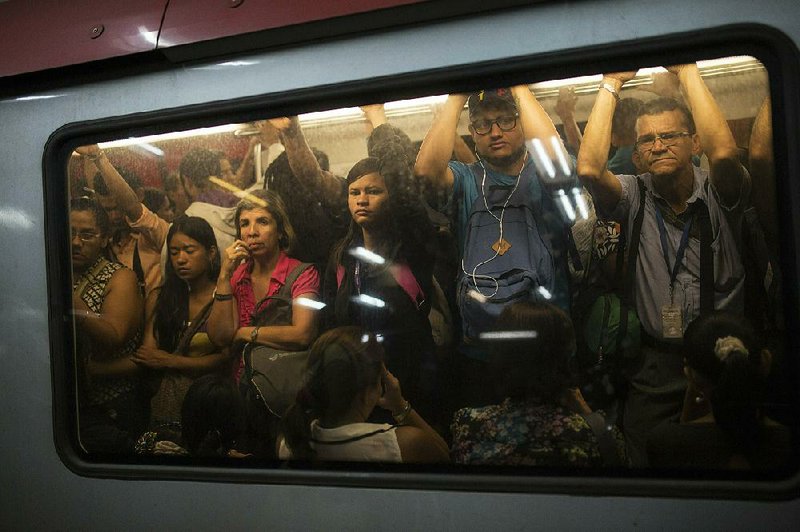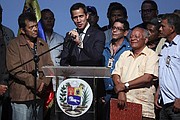WASHINGTON -- The commander of U.S. forces in South America briefed top administration officials Friday on the crisis in Venezuela and options for potential military action.
The session highlighted the administration's effort to suggest the possibility of military action, perhaps as a way of increasing public pressure on Venezuelan President Nicolas Maduro, although there appears to be little likelihood of direct U.S. military intervention.
In an interview with a small group of reporters, acting Defense Secretary Patrick Shanahan said Navy Adm. Craig Faller, commander of U.S. Southern Command, flew to Washington to meet with him and other senior officials, including Secretary of State Mike Pompeo and John Bolton, President Donald Trump's national security adviser.
They reviewed and refined military planning and options for responding to the crisis, Shanahan said. He declined to provide details and gave no indication they made decisions to take any military action.
"We have a comprehensive set of options tailored to certain conditions, and I'm just going to leave it at that," he said. Pressed to say whether the options include direct military intervention, he said, "I'll leave that to your imagination. All options are on the table."
Faller's area of responsibility includes Venezuela, and U.S. air and naval forces in the region are capable of conducting surveillance that could support intelligence collection inside Venezuela. The Trump administration's emphasis has been on diplomatic and economic pressure to try to compel Maduro to step aside.
Asked whether Venezuela poses a national security threat to the United States that would justify using U.S. military force, Shanahan said Russia, China and Iran are involved in Venezuela, and then added, "Right now it's about Maduro and his illegitimate regime, and [opposition leader Juan] Guaido and making sure that the people of Venezuela have the environment and the conditions to correct for all these humanitarian shortcomings."
Sen. Lindsey Graham, a South Carolina Republican, wrote on Twitter, "Where is our aircraft carrier?" Asked to comment on that suggestion, Shanahan told reporters, "All [options] would include all."
Shanahan said he wanted an update on the situation in light of this week's developments in which Guaido called for a military uprising two days earlier. The attempted uprising failed to push Venezuela's military into rebellion but was followed by deadly clashes between protesters and police in cities across the country.
"This was really a true review, and then making sure we're all in alignment" within the administration, he said.
Asked whether the failed attempt to spark an uprising to oust Maduro suggests faulty U.S. intelligence, Shanahan said, "I feel very confident in the quality and the accuracy of the information that we're getting." He added, "I don't feel like we have an intelligence gap."
Pompeo told Fox News on Thursday evening that he remained hopeful that Venezuelans would rise up.
"The military didn't fracture in the way that we would hope, but it's just a matter of time," he said. "It's the case that Maduro may rule for a little while longer, but he's not going to govern. Structurally, there's no way he stays in power. It's time for him to leave, and we need the Cubans and the Russians to follow him out the door."
Also attending the Faller briefing were Director of National Intelligence Dan Coats, acting White House Chief of Staff Mick Mulvaney, and Marine Gen. Joseph Dunford, chairman of the Joint Chiefs of Staff.
At the White House, spokesman Sarah Huckabee Sanders reiterated that "the president's going to do what is required if necessary," but did not elaborate.
After days of upheaval in Venezuela, the country is sinking back into political stalemate.
In the fourth month of their standoff, Maduro and Guaido are unable to deliver a knockout blow as Venezuela spirals deeper into neglect, isolation and desperation. Abrupt shifts or behind-the-scenes power plays can't be ruled out, but there is a sense that the two camps are entrenched -- too strong to be dislodged, too weak for clear-cut victory.
The streets of Caracas were calm Thursday and Friday, although Guaido called on protesters to gather outside military bases today to try to persuade soldiers to support them. He is also planning a general strike, though how effective that would be in a country with a shattered economy and an exhausted population is open to question.
Maduro's government is under strain, loathed by much of the population as it attempts to steer a decaying nation. The fact that it has not yet moved to arrest Guaido after accusing him of trying to stage a coup suggests that it is not confident enough to do so and is wary about any increase in diplomatic and economic pressure from the U.S. and dozens of other nations that say Guaido is Venezuela's rightful president.
Any attempt to detain Guaido would be "highly inflammatory," said Eileen Gavin, senior Latin America analyst at Verisk Maplecroft, a global risk consultancy.
"From Maduro's perspective, it might be better to simply dismiss Guaido as a mere nuisance and a U.S. stooge, thereby undermining Guaido's faltering movement and -- once again -- splintering the fractious Venezuelan opposition," Gavin said in a report.
COURSES OF ACTION
The White House, meanwhile, is calling for relevant departments to produce more options for the president to consider on Venezuela.
Current and former officials recognize there are not many more options other than military action or some type of internal revolt.
"It's more sanctions, military or straight up Venezuela flipping," said a senior administration official on condition of anonymity. "And that's a problem. All they have to do is delay, delay, delay and they're still in power."
The increased attention to a military option is raising concerns across Washington and the region. Some diplomats and former Trump officials spoke out against the use of unilateral force and argued it's time for a shift in strategy.
Fernando Cutz, a former acting senior director for Western Hemisphere Affairs at the National Security Council in the Trump administration, said the United States has driven itself into a corner because of the "reckless rhetoric."
"We've been talking this up so much that there is a real expectation from the Venezuelans on the ground that the United States is prepared to act," Cutz said. "You haven't left any room for interpretation on the rhetoric. You have been very, very direct, saying 'military, military, military.' So what do you do? Anything short of military action that leads to the restoration of democracy in the country would not be seen as a success."
Some Trump allies are pushing the administration to take stronger steps, including authorizing covert operations and psychological warfare.
Jose Cardenas, who served in the National Security Council under President George W. Bush and regularly speaks with Trump administration officials, said there is a "crying need to undermine" the confidence of Maduro's inner circle.
"We need out-of-the-box thinking," Cardenas said. "We need to engage with the intelligence community to find out what's within their capability to do things that they do that will change the equilibrium. ... We need to play mind games with this regime so they don't know what is coming or going."
Florida's U.S. senators are also increasing pressure on the Trump administration to act on the crisis in Venezuela, calling it a national security matter.
After a Friday discussion with Venezuelan, Cuban and Nicaraguan exiles, Republican Sens. Rick Scott and Marco Rubio chastised Cuba for aiding Maduro.
The Cuban government denies accusations that it has troops in Venezuela.
The U.S. and more than 50 nations view Maduro's re-election last year as illegitimate because of fraud.
Rubio mocked reports that Maduro was defeating Guaido.
"This notion that Maduro is winning is ridiculous," he said. "This is a peaceful movement of civil disobedience."
Rubio said there are no questions there's a real threat to the U.S. He said the U.S. government must be prepared to face Venezuela, and suggested the militant Hezbollah group is present in the South American nation. The leader of Lebanon's militant group has denied the claim.
Scott said the U.S. military must deliver humanitarian aid to stop what he called a "genocide," caused by shortages of food and medicine. He warned Venezuela could become the next Syria.
"You look at all the bad players and see what happened there. You got Russia, you got Iran, you got Hezbollah. They are all there," Scott said. "To think that we are not going to have Syria in this hemisphere if we don't deal with this now. It's going to happen, it's just when it happens."
Information for this article was contributed by Robert Burns, Christopher Torchia, Joshua Goodman and Adriana Gomez Licon of The Associated Press; and by Franco Ordonez and Tara Copp of the McClatchy Washington Bureau.
A Section on 05/04/2019

